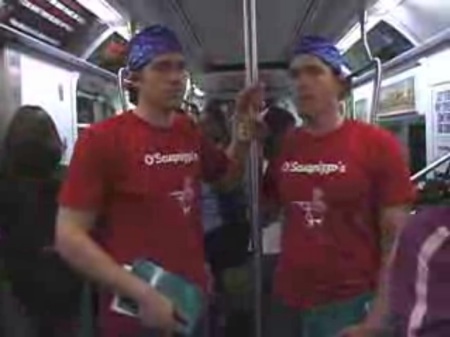Pranksters 2.0
A clear emerging trend is nicely named and featured in the WSJ article, New Pranksters.
Pranks have gone from legendary spoofs in college fraternaties in the 1950s, to subversive happenings by political activists in the 60s and 70s, to conceptual art pieces by maniacal artists into the 90s. Now they are errupting online as a social media web 2.0 event.
Examples of the new pranksterism can be found in the wonderful pranks by Improv Everywhere. (And they do seem everywhere; you can sign up for your local Improv Everywhere chapter, and you’ll get email or Facebook notices when a prank in your neighborhood is about to hatch.)
My favorite IE happening is the Food Court Musical.
The Human Mirror — a dozen sets of twins mirror each other on the subway — is short but good, too.

The new pranksters are new in this way:
1) New pranks are entertainment. Rather than being politically subversive, they aim for a wow!
2) New pranks are social. Rather than relying on a lone jokester, or even small band, these may involve hundreds or more instigators. The more the merrier.
3) New pranks are broadcasted. The audience is not primarily those who are present but those who are not.
The WSJ article does a swell job of rounding up some great examples and even showcases a few prank groups that are in the inevitable process of becoming commercialized. Including being filmed for commercials — a sure sign of their mainstreaming.


